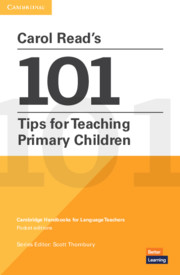Book contents
- Frontmatter
- Contents
- Acknowledgements
- Why I Wrote this Book
- A Getting Started
- B Core Skills
- C Classroom Management
- D Lesson Planning
- E Learning how to Learn
- F Storytelling
- G Playing Games
- H Values Education
- I Songs, Rhymes, Chants and Raps
- J Working with Projects
- K Intercultural Competence
- L Content-Based Learning (CLIL)
- M Thinking Skills
- N Vocabulary
- O Life Skills
- P Art, Craft and Design
- Q Mime and Drama
- R Inclusion and Diversity
- S Creativity
- T Adapting or Writing Materials
- U Listening and Speaking
- V Reading and Writing
- W Multiliteracies
- X Grammar
- Y Assessment
- Z The Last Word
- Glossary
- Selected Further Reading
- Index
W - Multiliteracies
Published online by Cambridge University Press: 28 October 2023
- Frontmatter
- Contents
- Acknowledgements
- Why I Wrote this Book
- A Getting Started
- B Core Skills
- C Classroom Management
- D Lesson Planning
- E Learning how to Learn
- F Storytelling
- G Playing Games
- H Values Education
- I Songs, Rhymes, Chants and Raps
- J Working with Projects
- K Intercultural Competence
- L Content-Based Learning (CLIL)
- M Thinking Skills
- N Vocabulary
- O Life Skills
- P Art, Craft and Design
- Q Mime and Drama
- R Inclusion and Diversity
- S Creativity
- T Adapting or Writing Materials
- U Listening and Speaking
- V Reading and Writing
- W Multiliteracies
- X Grammar
- Y Assessment
- Z The Last Word
- Glossary
- Selected Further Reading
- Index
Summary
Multiliteracies refer to understanding and communicating meaning in multiple modes. They form an integral part of children's emotional, psychological, social and cognitive development both at home and at school. They also enrich and extend children's language and communication skills.
Multiliteracies involve supporting children in constructing and creating meaning from non-linear, multimodal texts, including print, images, graphics, audio, film and music. Through multiliteracies, you can also introduce children to critical literacy.
By using multiliteracies in your everyday teaching, you are likely to make a significant and motivating contribution to the development of children's basic literacy skills. The opportunity to use digital, multimodal means to do things such as listen to podcasts, watch videos, play games, do research, create projects, stories or presentations in English lessons, provides a purposeful and enjoyable context for children to apply and practise their skills.
However, for some children, multiliteracy activities may be a source of distraction or confusion. You therefore need to plan carefully to ensure that they are neither over-stimulating nor over-long, and that children have appropriate learning support. You also need to keep a healthy balance between screen and face-to-face time in order to sustain everyone's interest over the longer term.
My key tips for multiliteracies are:
89 Integrate digital media and technology
90 Develop visual literacy
91 Use multimodal texts to enrich learning
92 Lay the foundations of critical literacy
89 Integrate digital media and technology
By using digital media and technology tools, as available and appropriate, you provide variety and enrich learning.
Working with digital media and technology is standard in many contexts. For children, this offers the opportunity to work independently and develop digital literacy skills, such as researching, creating content and collaborating online. At the same time, children's online safety is crucial (see 58). You also need to be aware of the potential impact of screen time on children's attention skills, physical and mental health. This means balancing the use of digital media and technology with face-to-face communication, physical movement and experiential learning in class. A key question to always ask yourself when planning to use digital media and technology is: what is the learning benefit of doing it this way?
- Type
- Chapter
- Information
- Carol Read’s 101 Tips for Teaching Primary Children , pp. 111 - 115Publisher: Cambridge University PressPrint publication year: 2020



